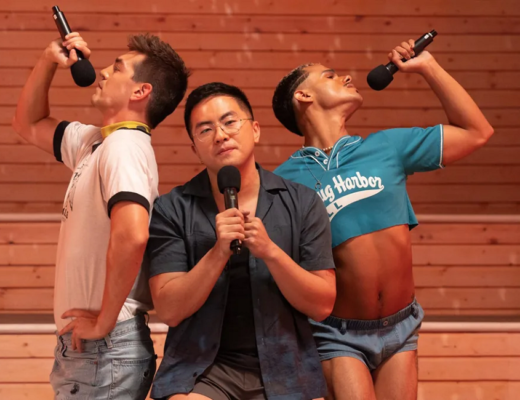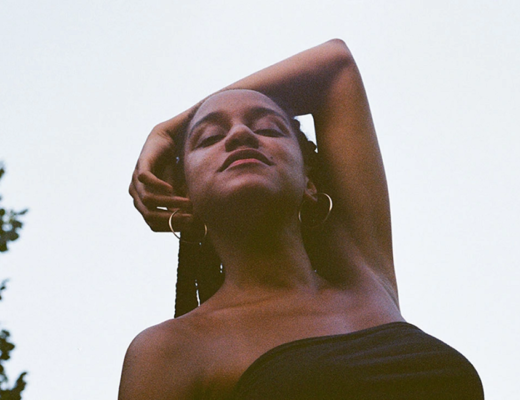House of Darkness absolutely butchers its attempt at a female empowerment tale, landing somewhere between overtly offensive and appallingly stupid.
It’s feast or famine when it comes to playwright/indie provocateur Neil LaBute, who returns from a seven-year filmmaking sabbatical with not one, but two movies in the course of two weeks (although it remains unclear what dastardly deeds moviegoers committed to incur such vengeful punishment). Hot on the heels of the remarkably lazy neo-noir Out of the Blue comes the horror thriller House of Darkness, and let it be said that, on both purely technical and storytelling levels, it is indeed the better film. Unfortunately, it’s also entirely reprehensible, a tale of faux female empowerment from a seeming misogynist who is completely incapable of anything resembling sincerity. Justin Long and Kate Bosworth star as Hap and Mina, who, as the film opens, have just arrived at her palatial manor in some unnamed countryside. As is eventually made clear, the two met at a bar earlier that night, and Hap agreed to take Mina home in the hopes of getting laid.
What follows is a two-hander chamber drama in which the potential love birds talk about such varied topics as honesty, honesty, and honesty. You see, Mina is honest to a fault, while Hap is an admitted fibber. LaBute, if nothing else, is known for his razor-sharp and cutting dialogue, but most of the conversations in House of Darkness bafflingly consist of Hap saying something stupid and Mina responding with, “What do you mean?” To his credit, Long nails the awkward and banal small talk that so often plagues such an encounter, the stammerings and ramblings of an inebriated man desperately trying to fill the space before the expected main event. In fact, for a while he honestly doesn’t seem like that bad of a guy, until a phone conversation with a friend has him talking about getting his “brains fucked out” and the possibility of taking pictures during the intended romp. Mina, meanwhile, asks a lot of loaded questions that seem borderline insane, yet Hap is too horny to see the red flags, of which there are plenty.
House of Darkness plays a bit like an extended version of the meet-ups from Promising Young Woman, in which Carey Mulligan’s protagonist confronted sexual assaulters, giving them a long-winded monologue before vanishing into the night. One of the biggest issues with that particular film was that writer-director Emerald Fennel never had the guts to follow through with Mulligan’s actions, thinking a stern lecture constituted adequate punishment for a series of men who had designs on sexually assaulting an inebriated woman. Hap, for his part, is the type of guy who asks permission before every action, strictly adhering to the mantra, “Consent is key.” Sure, he’s a bit of a pig, especially when Mina’s attractive sister, Lucy (Gia Crovatin), makes a sudden appearance, but he never crosses the line into outright criminality, which muddies LaBute’s intentions to a degree that leaves the resulting film quite confused. As LaBute has proven multiple times in the past, he is incapable of writing three-dimensional female characters, and that goes triple for House of Darkness, as we ultimately get a third sister, Nora (Lucy Walters), in the mix. All three are defined by a past trauma, an insatiable appetite for vengeance, or both, resulting in their ultimate actions being completely devoid of empathy. To truly work as a tale of empowerment, you need an antagonist so wrongheaded or morally bankrupt that the comeuppance feels not just justified but righteous, yet LaBute weirdly portrays Hap as simply smug and horny, and while that certainly makes him obnoxious, it doesn’t warrant the sheer and utter horrors that await him come film’s end. In LaBute’s world, the worst thing you can do is call a woman the C-word, which is so juvenile that it neuters the film of any sort of bite.
Speaking of, House of Darkness has a big twist up its sleeve, one so obvious that viewers are likely to be screaming at the screen by minute ten. It’s quite clear that LaBute wants his audience members to side with his trio of women, but at the same time, he renders them as such one-note caricatures that their final actions seem merely deplorable, just another example of man-eating bitches destroying a helpless dude. In the era of #MeToo, it’s fairly remarkable that any filmmaker could spin a “female empowerment” tale that somehow lands on the side of the male, but LaBute once again proves that he is more than up to the challenge, saturating his film in grating self-congratulation while demonstrating his complete inability to understand any nuance of this particular messaging. If these are the fruits of a seven-year break, then God help us all in 2029.







